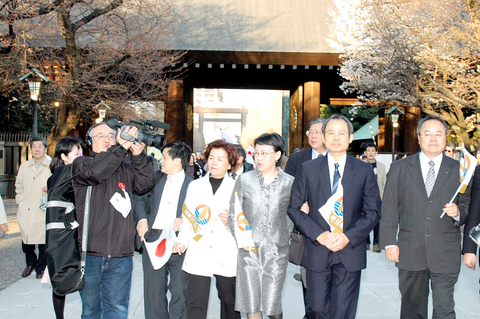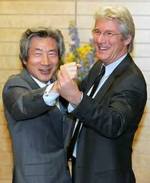Well, it’s happened again. From the BBC report:
Japan has approved a set of new school history text books whose version of past events has already sparked complaints from South Korea and China.
One of the eight texts is an updated version of a book which triggered diplomatic protests in 2001.
Seoul said the new books sought to glorify Japan’s war-time past, a continuing source of regional tension.
It goes on for a while about the problems in the new book, the protests, the history of Japanese Imperialism and so on, but what is to me the most important fact is buried towards the end of the article.
This book is currently in use in fewer than 0.1% of Japan’s schools, but this time the authors are hoping for a better response.
Why is the adoption rate of this textbook so low? I think the answer is clear-few teachers are interested in giving their students a piece of shit biased textbook that overlooks such major historical facts! The protestors would have a valid position if this was a government issued textbook, but they are blatantly misunderstanding the situation.
In Japan textbooks are not written by the government. In the case of this history book, the author is a minor right-wing group named The Society For the Creation of New Textbooks,
which is no more catchy in Japanese. The job of the Ministry of Education in Japan is not to choose the textbooks that schools use, but to check the content that they do have for factual accuracy, not to mandate exactly what they teach. This is a marked contrast to the situation in all of the protesting countries, where primary school textbooks are created and issued by the government. [Update: Nora Park tells me that textbooks in South Korea are actually written by private companies following government guidelines.] The Japanese Ministery of Education in fact approves a number of textbooks, from which public schools are free to choose.
But this raises the question of why? Why do they have this semi-controlled market, instead of either opening up the market completely or just mandating textbooks? I can’t answer that, but I do think that they should reconsider the practice. Clearly their vetting process does nothing to keep utterly worthless textbooks off the market, and contributes to one of Japan’s worst ongoing diplomatic crises in years. If the book in question was simply on the market, instead of sort of govermnent approved would this even raise eyebrows in Beijing or Seoul?
Oh, and does anyone else find it interesting that there have been no protests in Japan’s other major former colony, Taiwan? Could their feelings for Japan actually be that much friendlier?
For some more, hopefully not too biased, information on the Nanjing Massacre itself, see as always the Wikipedia article.









